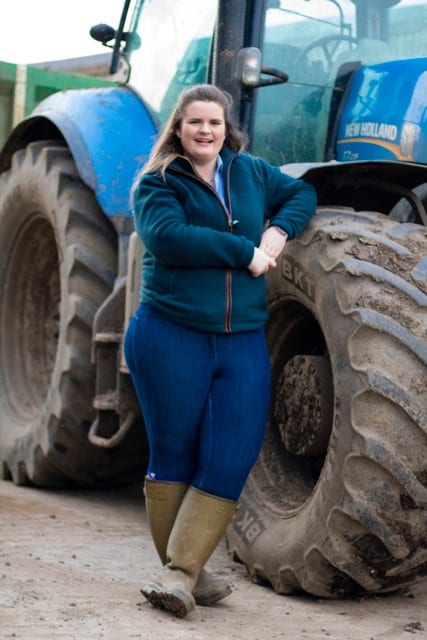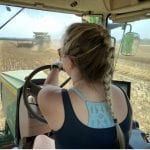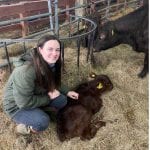
05 Mar International Women’s Day … in Farming part 2
International Women’s Day … in Farming
Let’s meet the first two inspiring women
3 March 2021
To mark International Women’s Day in March and the rise of female farmers, we are celebrating some incredible females who are a growing force in farming.
We are shining the spotlight on the varied and integral roles that they play and promoting farming equality. Not only does this profile their amazing work but also projects the rise of women in farming and their increasing role.
The agricultural industry is brimming with inspiring women as they share their farming journeys – bringing women together in the industry! As more women are becoming involved in agriculture, a traditionally male-dominated industry, it is important to showcase the abundance of opportunities out there for women, not forgetting that there’s no singular role that women cannot undertake.
There are plenty of incredible women to celebrate in the industry, and we are featuring just a smidgen of incredible females making their mark in the agricultural world and proving a woman’s place is firmly at the forefront of modern farming and they are a powerful force to be reckoned with!
Meet our first two inspiring women….
Eveey, 26 years old

Role: Farmer
Name of farm: Pursley Farm Shenley, based in Hertfordshire
How did you get into the farming career, what is your back story?
It is a family farm, and it is all I’ve ever known, as I was born onto the farm, I can’t see myself ever doing anything else. The type of farming is arable, combinable crops, based in Hertfordshire. Growing up I was always helping Mum and Dad on the farm, it being an unusual career meant that we spent summer holidays on the farm rather than go away – Skiing was the only holiday we were allowed! I have 2 brothers, one works on the farm and the other is a handyman. I do a lot of office-based work on the farm too, focusing on diversification and the business side of it and the running of everything else on the farm. I also drive a tractor during harvest.
As a Farmer’s daughter, is it expected to carry on the role?
I was stubborn and wanted to do what the boys did, I was never pushed into it, as it’s not an easy career to be in, you’ve got to be willing to get stuck in. You have to learn the business inside out, how to maximise the business. I took on the role of selling grain to Cefetra and I found Cefetra nice to work with and highly efficient.
What does your working day what look like?
It depends on the time of year, during Harvest I dip in and out of the office, the rest of the year I do everything in the office – grains, sales, farm insurance, payrolls, finance side, and making arrangement for the haulage company that we work for; I manage the paperwork for that. I try to take on as much as I can, taking the stress off my dad as much as possible. We are doing more now than we originally did as he wants to farm the world!
3 benefits to be in farming in 2021 over another industry?
With Brexit there has been more opportunity than ever to showcase British farming. What we are trying to sell is unique as it’s British and that’s what we should focus on. There are so many jobs in farming that women don’t realise they will be capable of. They think farming is just milking cows, riding tractors – the technology and science behind new grain varieties is mind blowing. You don’t need a background in farming to be interested in it, nor to embark on a new adventure in the field.
Is acceptance of female farmers growing?
As a female farmer you deal with anything and everything in terms of machinery, the sector is definitely growing, acceptance can vary, this generation of farmers are from the livestock sector which generally only employed men, so some are still stuck in their ways, but this is dramatically changing.
Is this a progressive industry that you work in?
There are so many opportunities that people aren’t aware of, women that I’ve previously worked with and there are a lot of gateways to other jobs.
What extra challenges have you faced in the pandemic?
It hasn’t actually affected us as farmers as we’ve carried on and there has been in fact more a demand for our products, especially combinable crops. People are using farming shops more and showing appreciation for home grown food and getting out in the countryside. A negative impact has been field margins getting trashed as there has never been so many people walking in the fields, and people are just walking into crops…
How do you stay connected with other female farmers?
NFU student and young farming ambassador programme, zoom call every week, we catch up on campaigns in farming, there are 11 of us, 6 of us girls.
What have you enjoyed most about your role?
It’s not for everyone, but it’s family based and a close knit community, so you unite and support each other, everyone gets involved and stuck in. People will bring you out dinner during the harvest, everyone is together, if a new idea is spoken about amongst each other, you can then see the idea grow into something, together you can appreciate the hard work, see it all paying off and materialising into something incredible.
Melissa, 23 years old

Role: Breeding Enhancement Assistant/Technician
Based: Hertfordshire
What role do you play, what does your day-to-day job look like for you, what are the main tasks that you have to complete?
I am a Breeding Enhancement Assistant/Technician, assisting the breeding team and trial team at KWS. I originally studied Agriculture at University part time, and I’ve carried on working in the industry since. I work at KWS, carrying out agricultural crops and breeding trials, producing different crop varieties – I help run their projects, analysing latest crop varieties. In winter I will be in the glass house, harvesting crops, that we’ve grown by hand and sewing new seeds that go into glass houses. In February we start our breeding programmes, cross wheat breeding programme – which links in the science side that I enjoy! You will then start disease scoring, walking the fields and gathering data for the different varieties, then summer we are harvesting.
What aspect of the role do you most enjoy?
No two days are the same, you are constantly doing something, be it whether you’re with the breeding team or the trials teams, you can cross between them. I was a new entrant into agriculture not from a farming background, and although you assume it is a male orientated role, you don’t realise how many different roles there are in the industry for everyone. Behind the scenes it’s so interesting, finding out how these crop varieties come about and how much science and technology go into farming – it isn’t just about driving tractors!
How did you get into the farming career, what is your back story?
I wasn’t born into farming. I lived in a rural area and became interested in agriculture, as I was horse riding. You’d ride into the stubble fields and not realise what happens and the hard work that goes on. I worked at an office based in a barn, I was constantly looking outside at the harvest thinking I would much rather be outside in the field rather than the office. Researching into science, agriculture was the answer and natural progression. It meant that I was able to work outside and inside, and still propel at the science side.
What are the benefits to farming over another industry, why is it so great?
Being outside the majority of the time, the connection with nature and seeing a lot of things that you wouldn’t see in the office. The unpredictable nature of the role and industry, every day is different, and every year is different.
How many other female farmers do you know?
More women are getting involved in farming, there are a lot of female tractor drivers, doing the same roles and are not judged for it, the men see you as equal, don’t see you as being a girl and being incapable of doing the technical and practical side or stereotypical “male orientated” roles. Year on year more women are coming into the agricultural industry.
What exciting opportunities and roles are out there in the agri world for female farmers? How long have you worked in the industry?
A progressive industry that is continuously moving forward ever-changing to keep up with government policies, climate change and there are plenty of new technologies arriving and there is no reason why farmers can’t get involved.
How do you stay connected with other female farmers? Do you think the acceptance of female farming is growing?
Through the world of social media I stay connected, Instagram mainly, twitter is great in the farming community, finding out each other’s farms and industry there’s a big community of farmers on social media.




Sorry, the comment form is closed at this time.